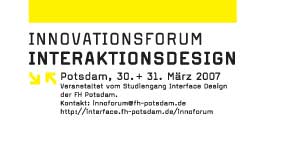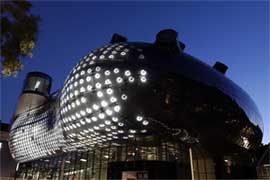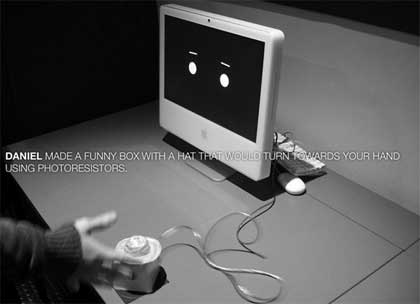 Reason to be happy in Berlin 3: Potsdam is a short train ride away and if a visit to Sanssouci or the studio where Metropolis was shot is not your thing, then how about this:
Reason to be happy in Berlin 3: Potsdam is a short train ride away and if a visit to Sanssouci or the studio where Metropolis was shot is not your thing, then how about this:
The BA/MA Programm Interaction Design where Reto Wettach is teaching and the Interaction Design Lab of the University of Applied Sciences are organizing a two day conference on interface and interaction design on March 30 and 31. Innovation Forum Interaction Design will discuss all aspects of the field: mobile telephone and media interfaces, problem solutions and product visions, web pages and virtual worlds, art and commerce, business and science.
Who will be there? Gillian Crampton Smith who is developing a graduate programme of interaction design at the IUAV University in Venice, Anthony Dunne from Raby & Dunne and Design Interactions at RCA, Tim Edler from realities united, Frank Jacob from human interface, Gesche Joost from T-Labs, Bernard Kerr from Yahoo!, Patrick Kochlik and Dennis Paul from Art+Com, Kristjan Kristjansson from IBM, Bill Moggridge from IDEO and the book everyone talks about, Mike Richter from iconmobile and Darmstad University and science fiction author Bruce Sterling.

 Blood Bag by Raby & Dunne and Bix facade by realities united
Blood Bag by Raby & Dunne and Bix facade by realities united
In addition, projects on interface and interaction design will be presented by student teams from six European universities.
The IFID will be held in the brand new Hans Otto Theatre Potsdam. On the evening of the 30th, the play Mobil (mobile phones are the central theme) from Sergi Belbel will be performed at the Hans Otto Theatre.
The event is free! But seats are limited and you have to register before 15th March 2007.
I asked Boris Müller, who organizes the conference and teaches at the Interface Design programme in Potsdam, to tell me more about the event:
Which criteria guided the selection of the speakers of Innovationsforum?
 The conference Innovationsforum Interaktionsdesign is a design conference. So the selection of the speakers was very design-driven. As interaction design is highly interdisciplinary, some contributions will cross the border to other disciplines like art, science, architecture or economics. The overall theme however will be design.
The conference Innovationsforum Interaktionsdesign is a design conference. So the selection of the speakers was very design-driven. As interaction design is highly interdisciplinary, some contributions will cross the border to other disciplines like art, science, architecture or economics. The overall theme however will be design.
An important aspect of the Innovationsforum is to present the field of interaction design in all its depth. Every speaker represents a very specific approach to interaction design. Not only in terms of scale and medium – Mike Richter will talk about mobile media, Tim Edler about interactive media facades – but also in terms of concepts.
This idea is transparent in the programme. Bill Moggridge, who is probably one of the most famous and experienced interaction designers, will give the opening keynote. Bruce Sterling, science fiction writer and visionary will give the closing keynote.
Who should be interested in attending the event? Is it only for experts in the field?
I believe the Innovationsforum will be highly relevant for people from quite a number of different backgrounds. The conference is not focussing on one particular aspect of interaction design. So you don’t have to be an expert to follow the discussions and presentations.
Being a design conference, the event will definitely be inspiring for design students and design companies. However, as interaction design is a driving force for innovation, the conference will provide plenty of new and valuable insights for small and medium-sized enterprises – especially from the area of information and communication technologies.
 Input Output and Things In Between (more)
Input Output and Things In Between (more)
You’re also planning to involve students from design schools, can you give us more details about it?
In the last few years, a number of design schools throughout Europe have set up degrees in interface- and interaction design. We believe that the Innovationsforum is a great opportunity to bring six of these schools together. The presentations of all schools will provide an overview of interaction design education in Europe.
We have invited the schools: Interaction Design / K3 Malmö University, Design Interactions / Royal College of Art, Interaction Design / HGK Zürich, Interactive Digital Media / Ravensbourne College, Digitale Klasse / UdK Berlin and Interface Design / FH Potsdam.
Every student team from every school will have exactly 10 minutes to present their work and their courses. So the audience will have the pleasure to get one hour of intense and fast-paced presentations of new ideas and projects.
Thanks Boris!
